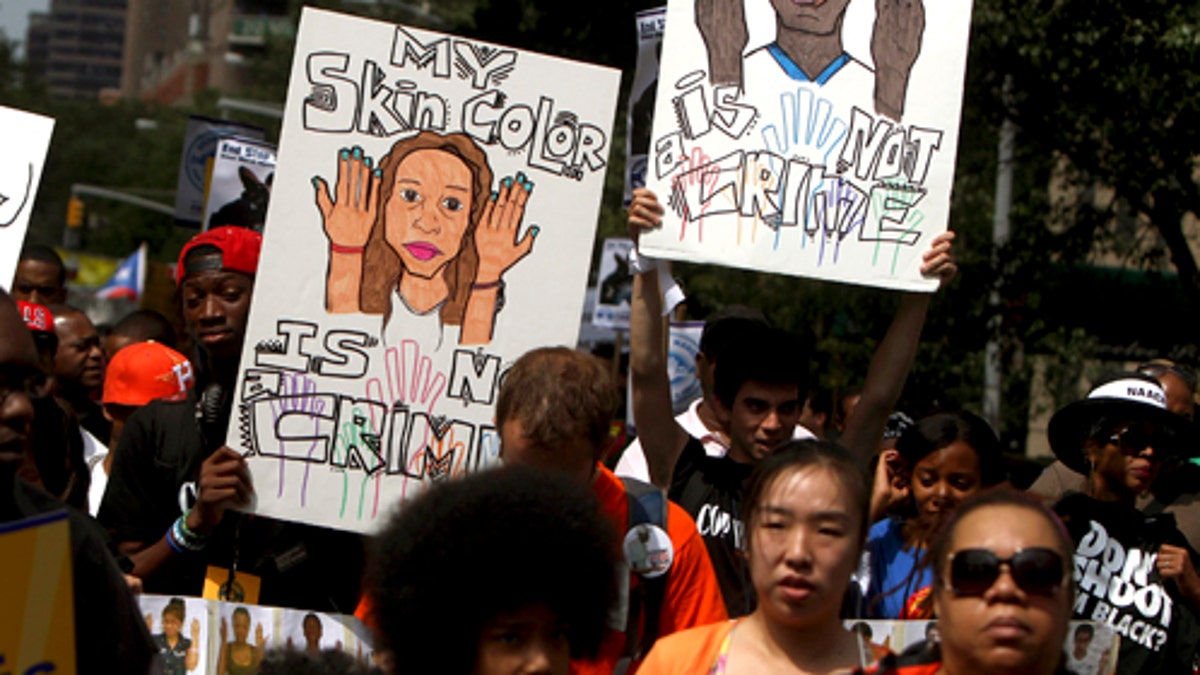
FILE - In this June 17, 2012 file photo, demonstrators hold signs during a silent march in New York to end the New York City Police Departmentâs "stop-and-frisk" program. A federal trial is scheduled to begin in New York on Monday, March 18, 2013, where the NYPDâs practice of stopping, questioning and frisking people on the street will face a sweeping legal challenge. The outcome could bring major changes to the nation's largest police force and could affect how other departments use the stop and frisk tactic. (AP Photo/Seth Wenig, File) (AP2012)
New York – A New York City police officer said his bosses can care less whether patrol officers do their duty to serve and protect the city's residents -- what they're truly concerned about, he alleged, are quotas.
In a class-action lawsuit in Manhattan brought by people claiming to be victims of alleged racial profiling by the New York Police's "stop and frisk" policy, officer Adhyl Polanco said his superiors told him that he needed 20 summonses, five street stops and one arrest per month.
It didn't matter whether the stops were done properly, he said.
"They will never question the quality. They will question the quantity," Polanco said Tuesday in court.
Polanco, whose testimony continued Wednesday, was one of two department whistle blowers expected to discuss a culture that revolved more around numbers and less around actual policing — and what lawyers said is leading to tens of thousands of wrongful stops of black and Hispanic men. Audio recordings from a third whistle blower would also be played.
The class-action lawsuit in federal court challenges the constitutionality of some police stops. There have been about 5 million stops made by police in the past decade. City attorneys said officers operate within the law and do not target people solely because of their race. Police go where the crime is — and crime is overwhelmingly in minority neighborhoods, they said.
Polanco said Wednesday that if he didn't get the numbers while working patrol in the 41st Precinct in the Bronx, he'd face poor evaluations, shift changes and no overtime.
He started recording some of the instructions because he thought no one would believe him. Lawyers played some of the secret audio recordings on Wednesday.
"They can make your life very miserable," he said of the department.
Police officials have said that they do not issue quotas, but set some performance goals for officers.
Polanco, who joined the force in 2005, was suspended with pay for years after internal affairs officers brought charges of filing false arrest paperwork; he said the charges came because he detailed a list of complaints to internal affairs. He now works in a department video unit.
The officers' testimony comes in the first week of the case, after four black men spoke about their experiences being stopped by police — they say because of their race.
City lawyers sought to show Polanco mischaracterized the incidents, and when asked to give specifics on which stops he felt were wrong, he could not.
The trial is seeking to reform the practice of "stop, question and frisk," a law enforcement tactic that has gained traction in the past decade.
The mayor and police commissioner said stop and frisk is a life-saving, crime-stopping tool that has helped drive crime down to record lows. Officers have more than 23 million contacts with the public, make four million radio runs and issue more than 500,000 summonses every year. Comparatively, 600,000 stops annually are not unreasonable, city lawyers said.
U.S. District Court Judge Shira Scheindlin, who has already said in earlier rulings that she is deeply concerned about the tactic, has the power to order reforms to how it is used, which could bring major changes to the nation's largest police force and other departments.
On the second day of the trial, city lawmakers said they had reached an agreement to install an inspector general for the NYPD following outrage over the department's monitoring of Muslims, and the stop and frisk tactic. The mayor has said he would veto the proposal, which has been condemned by police unions.
It's not clear whether the proposal for an inspector general would affect what changes the judge may make.
City Council Speaker Christine Quinn said talks were progressing on three companion proposals to set new rules surrounding stop and frisk, including expanding protections against racial profiling.
Proposed last year, the inspector general and stop-and-frisk measures have become enmeshed in the politics of the city's mayoral campaign. Quinn, a leading Democratic candidate, has faced pressure from civil rights and minority advocates and from some of her rivals to get the measures passed.
Mayor Michael Bloomberg, city lawyers and police officials said the department already has enough oversight, including an independent watchdog group, a 700-person Internal Affairs Bureau, a police corruption commission, prosecutors and judges.
Based on reporting by The Associated Press.
Follow us on twitter.com/foxnewslatino
Like us at facebook.com/foxnewslatino








































